City Takes Another Swing at Eventually Wooing Royals Downtown
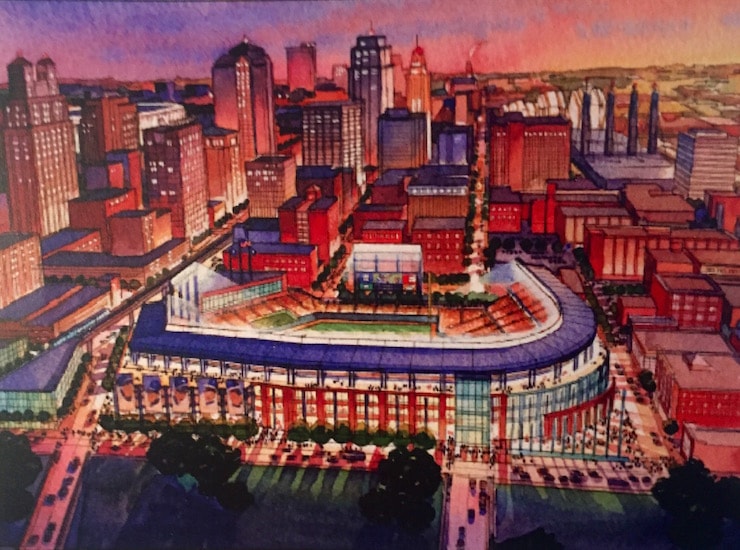
Published October 6th, 2017 at 12:15 PM
By Kevin Collison
Downtown baseball is back in the game with the city joining the Downtown Council and developer Jon Copaken in funding a $120,000 study intended to lay the groundwork for a full pitch to the Royals down the road.
The Kansas City Star reported this week the ongoing study has identified four sites as potential locations for what city officials estimate would be a $450 million replacement for Kauffman Stadium.
The Royals’ lease at Kauffman expires in 2030 and while that seems far off, sports architects estimate it would take about four years to design and build a new ballpark. That timeline doesn’t include how long it would require to assemble the land, a complicated task given its urban location.
So now is a good time to begin identifying and landbanking property for a potential downtown ballpark, City Manager Troy Schulte told CityScene KC.
“I think it makes sense to concentrate our assets to continue building walkability and density,” Schulte said. “The stadiums will be approximately 60 years old and there a lot of stakeholders including the county, the state and the team.
“We have a ton of work to do from a city perspective. I wanted to know feasible sites, because as development occurs, the cost of acquiring land goes higher.”
Two of the four downtown sites identified in The Star report are familiar to those who pursued an earlier effort to build a new downtown ballpark in 2005, when the Royals’ lease was last up. One is in the North Loop area, the other the East Village.
The other two suggested sites are near the Sprint Center, which didn’t open until 2007. One is directly north of the arena at 13th and Grand, the other is directly east on property owned by Jackson County. The 13th and Grand location also has been considered a potential office development site.
But City Manager Troy Schulte said the 13th and Grand property, which is controlled by Copaken Brooks, a prominent local development and property management firm, is probably no longer an option.
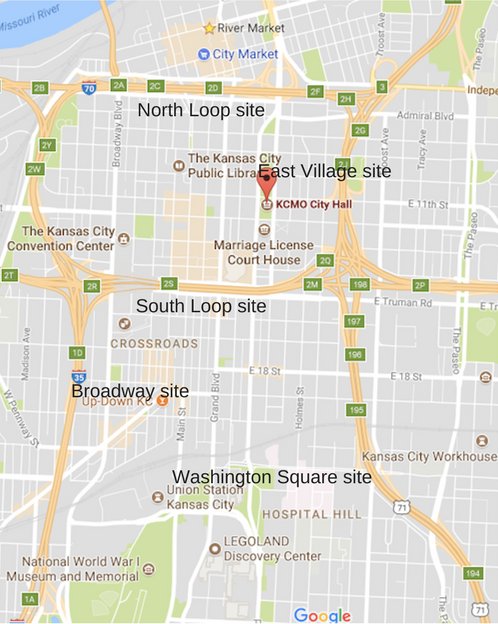
Downtown ballpark sites identified in the 2005 Barrett Sports Group report.
Schulte said information used for The Star site map is at least a year old, and since then, development, including the renovation of the Traders on Grand building and the Argyle building into apartments, has made what was already a tight ballpark site at 13th and Grand more precarious.
“I think that site is no longer viable,” Schulte said.
Tom Proebstle of Generator Studio said the ideal ballpark site is 18 acres which would include limited parking. He pointed out Target Field, the home of the Twins in downtown Minneapolis, was built on a very tight site of about 10.5 acres, with about 2.5 acres bridging highways and a rail line.
Target Field also is served by a light rail line, and downtown Minneapolis has a major parking garage complex nearby. His recent ballpark experience includes a study for new ballpark in downtown Tampa and a master plan to renovate Fenway Park in Boston.
Schulte said an ideal scenario would be to find a site that would not only accommodate a ballpark, but anticipated spinoff development as well.
Revenues from the new development could be used to help pay for the ballpark, much the way development in the Village West area of western Wyandotte County helped pay for the Kansas Speedway and Sporting KC facilities.
“It makes sense to do long-term land banking and obtain the development rights around it,” he said.
Schulte said the city contributed $40,000 to the three-year downtown ballpark study, with Jon Copaken and the Downtown Council contributing equal shares. The study began more than a year ago, he said.
Jon Copaken, a principal at Copaken Brooks and a longtime downtown ballpark advocate, declined to comment.
Bill Dietrich, president and CEO of the Downtown Council, released a statement: “The Downtown Council engages in a wide range of studies exploring the possibilities for future developments and investments to enhance downtown.
“We are always looking to ensure that we have current and relevant information regarding any future conversations involving major commercial, entertainment and cultural amenities.”
The Downtown Council spearheaded the previous effort in 2005 to bring the Royals downtown, hiring Barrett Sport Group to prepare a report. Barrett found that new downtown ballparks in places including Pittsburgh, San Francisco, Denver, Baltimore and Cleveland had all created powerful economic spinoff benefits.
The Barrett report recommended five potential sites: the North Loop; East Village; South Loop; Broadway and Washington Square Park. Later, an East Crossroads site south of 19th Street between Cherry and Oak, an area dominated by parking lots, was identified as a possible location.
The study estimated the cost of a 40,000-seat ballpark that would have opened in 2009 at $357 million including construction and land acquisition.
Thomas “Buzz” Willard, president and CEO of Tower Properties, was a key figure in that earlier effort to bring the Royals downtown. He was on the Downtown Council ad hoc ballpark committee and Tower Properties owns the bulk of the land at the North Loop location.
Willard said that North Loop property, all of four blocks and parts of two others, is still available.
A lot has changed since the earlier effort to woo the Royals downtown, Willard said. He noted that in 2005 then Mayor Kay Barnes was preoccupied with getting the Sprint Center built, and then County Executive Kathryn Shields, now a City Council member, was interested only in keeping the Royals at the county-owned Truman Sports Complex.
“We did a lot of work, but without political and governmental support, it was just too much,” he said. “Nobody could visualize how downtown would evolve, 10 years ago, it’s revival was still in its infancy.”
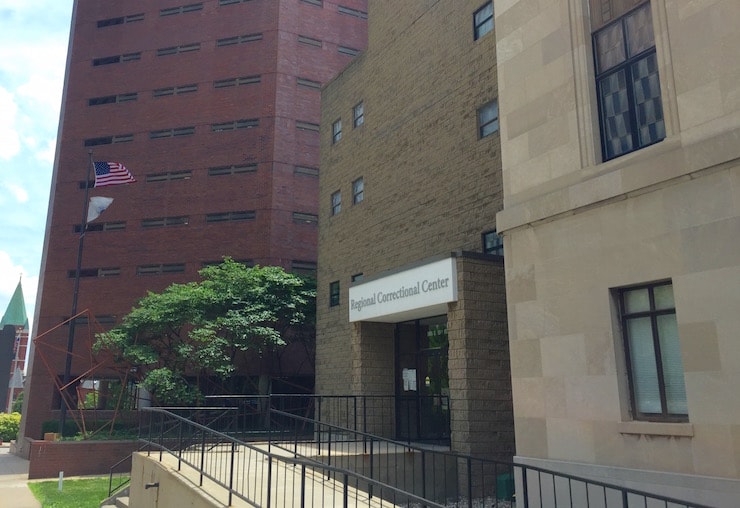
The Jackson County jail could be demolished to make way for a downtown ballpark under one development scenario.
One of the more intriguing ballpark site opportunities also could bring Jackson County to the table. The site east of Sprint Center includes a county-owned parking lot and the jail, a much-criticized facility that may have to be replaced in the not too distant future.
The Star map showed that location cleared of both the jail and the neighboring Fletcher Daniels State Office building at 615 E. 13th St.
The other location is the East Village, a large, eight-block development site that could easily accommodate at ballpark and spin-off development.
Jackson County Executive Frank White referred to a statement issued in July when the topic of downtown baseball was raised.
“The County is not advocating for, nor funding any efforts for any stadium relocation,” he said.
“Of course, we have been and will continue to be, open to listening and discussing with all parties involved opportunities to grow and build these great community assets.”
As for the Royals, they’re comfortable for now at Kauffman, although they acknowledged attending a meeting last spring regarding the latest downtown ballpark initiative.
“The city and some business partners approached us in May about some areas of downtown they wanted to investigate as possible long-term development, including a spot for a new downtown baseball stadium if that ever were to come to pass,” Toby Cook, vice president for publicity, said in a statement.
“Our senior vice president of business, Kevin Uhlich, attended and then told the group simply to keep us informed. We have a lease at Kauffman Stadium through 2030 and have every reason to believe we will be playing at The K through the lease.
“The time will come to discuss this further.. But for now, we have not had any meaningful discussions on what happens when the lease expires.”
Cook added, “We love Kauffman Stadium, and our fan base is very attached to the ambience inside and the convenience of easy access and a huge parking lot outside.”
And that parking is lucrative to the Royals as well.
In its 2005 report, Barrett estimated the Royals received $3.6 million in net revenues from parking annually. The report said the team would make only $610,000 in parking from a downtown ballpark.
Here are two potential downtown ballpark sites that came out in a previous effort in 2005:
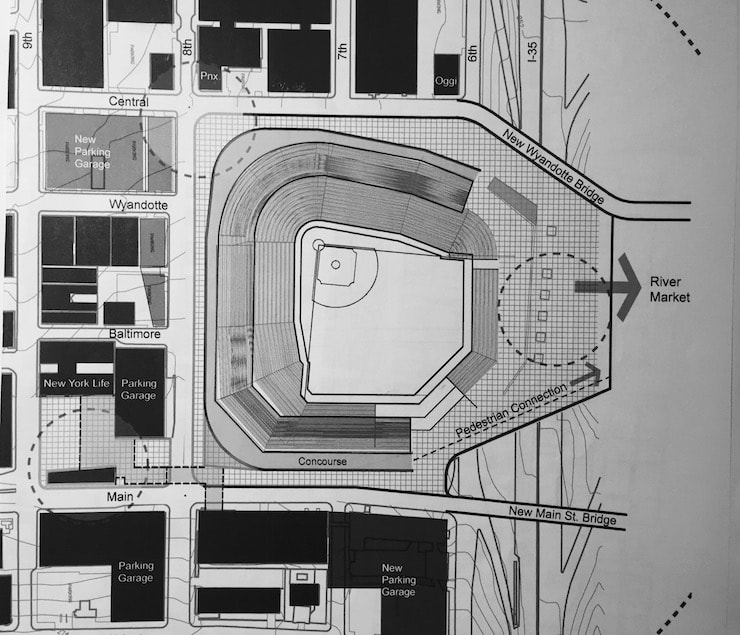
The North Loop proposal would have connected the Central Business District with the River Market.
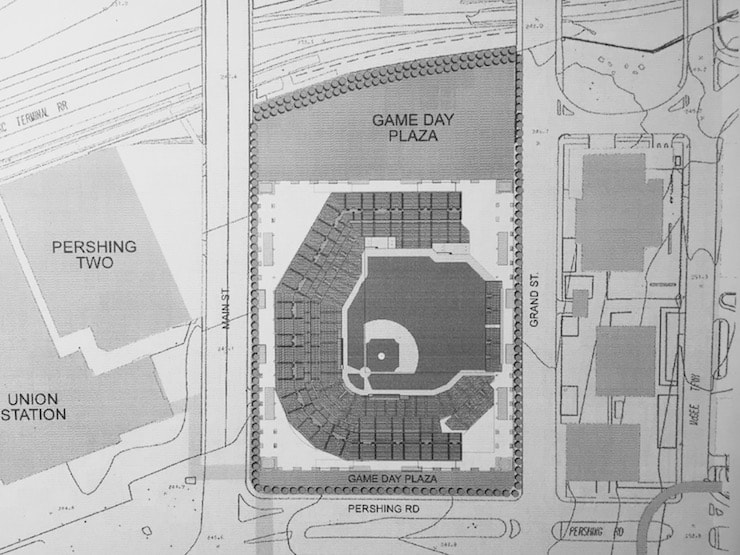
One proposal called for a ballpark to replace Washington Square Park.


